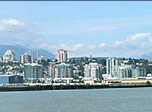Left to right - Minister of Crown-Indigenous Relations Carolyn Bennett, Chief Woos also known as Frank Alec, B.C. Indigenous Relations Minister Scott Fraser (Photo - Jonathan Hayward/The Canadian Press)
Pipeline Protests and Blockades March 1st, 2020 (Opinion)
There are a few aboriginal hereditary chiefs claiming to represent five “houses” of peoples who are against the construction of a pipeline in northern British Columbia. They come from some clans of the Wet'suwet'en people, which number about 3,443 (2020). These fellows have said they are uniformly against any pipeline through lands. They claim their authority by inheritance and designation without any democratic accountability. They have not been able to give a satisfactory account of how they maintain a legitimate mandate to reject and block pipeline construction. They are using the situation to extort a larger political-legal objective that they have not achieved otherwise, commonly known as “title”.
Alternately, Coastal GasLink says it has agreements with all 20 elected First Nations councils along the 670-kilometre pipeline route, but the hereditary chiefs in the Wet'suwet'en Office say they have “title” to a vast section of land and have never relinquished it by signing a treaty. While the Office of the Wet'suwet'en may have strong views, others are equally strong.
Although they have had broader self-governance talks with the BC government which are independent of any particular project, they take on new significance as a national debate over Indigenous land rights and sovereignty flares up across the country. The chiefs scuttled the very negotiations that were on the road to where they claimed they wanted to travel. There is no legal basis for shutting down the preparatory work for the pipeline project.
Historically, the Wet'suwet'en chiefs have had a financial sweetheart deal with governments. They have an Office in the town of Smithers BC, and have several locations, with some workers in Vancouver and other towns. They have a web site that makes grandiose claims. Their Office was created as a central office for Wet'suwet'en propaganda and operations. It's been running since 1994, and was formerly affiliated with the Gitxsan Nation for many years. The office is not an Indian band or tribal council. Based on the priorities set by the Board of Directors, staff negotiates program funding through various sources from federal and provincial governments and foundations. The office is governed by the Wet'suwet'en Hereditary Chiefs residing throughout traditional territories. The Chiefs meet throughout the territories in various locations. It has been derogatorily called by some “an old farts club” or the “17th-century native mafia” for how they treat the people they claim to represent. About $28 million has been received by this Smithers Office in the last 7 years, mostly from the Federal and the BC Provincial government. The BC government has given them millions for “services”. In fiscal 2019 they took in $6 million dollars. These working partnership arrangements did not satisfy their ever-escalating demands.
The Supreme Court of Canada in the Delgamuukw decision twenty years ago, stated that the Wet'suwet'en hereditary chiefs hold some authority on some of the lands they claim. Alternately, the First Nations peoples that support the pipeline are mostly from Indian Act reserves. The elected chiefs of these reserves hold authority only over reserve land as stated in the Indian Act, not on other territories. These elected leaders support the pipeline.
Wet’suwet’en blockaders prevented some Coastal GasLink workers (whose pipeline is supposed to transport natural gas to the Kitimat LNG facility) from passing through some territory. Under the authority of further Court Injunctions, the RCMP arrested 14 people associated with this incident on 7 January 2019. Therefore, while the Delgamuukw case was cited as an excuse by the blockaders, that case clarified some issues relating to Aboriginal “title”, but did not outright resolve them.
The Delgamuukw case gives some “title” standing, but it does not provide a full veto over projects, as now falsely claimed by the blockaders. Subsequent Court cases added to the labyrinth of notions about legitimacy and power, but there is no clear legal situation for the Wet’suwet’en Office chiefs. Radical leaning law professors who regularly appear in the media, enflame expectations of aboriginal privilege and confuse the public.
Aboriginal "title" constitutes a beneficial interest in the land, but the underlying control is retained by the Crown. Rights conferred by Aboriginal "title" include the right to decide how the land will be used; to enjoy, occupy and possess the land; and to proactively use and manage the land, including its natural resources. But the Court set out a mechanism by which the Crown can override Aboriginal "title" for the greater national interest.
In this case, the duties to consult and accommodate have all been excessively met for this particular pipeline construction. Wet'suwet'en was intimately involved in the design of the pipeline pathway. Consequently, the law gave the green light and was later confirmed by Court Injunctions. Therefore, it is clear that the blockaders do not have a legitimate legal argument against the pipeline. They should get on with negotiations with their main point about “title”.
The government is saying the territory is Crown land, the company has Crown permits, so therefore the development can happen. There has been no process by which Wet’suwet’en customary influence has been legally recognized. The Aboriginal “title” claims of the Wet’suwet’en chiefs have yet to be resolved either by negotiation or litigation. Wet’suwet’en customary behaviour is not recognized as being an effectual part of Canadian law. The rejection of the pipeline construction ended those “larger issue” talks.
The Wet’suwet’en community had an integral role in helping to shape this project from the very beginning. There were over 120 in-person meetings with Wet’suwet’en Hereditary Chiefs and have had over 1,300 other interactions (calls and emails). The company says it will continue to collaborate at every stage of the process. The company says “Our collaborative approach with the Wet’suwet’en has been meaningful and informative. Our detailed discussions included field schedules, archeology programs, spatial files, stream crossings, wildlife and vegetation field data, technical reports and surveys.” “Extensive discussions have taken place with the community regarding the selection of the proposed route. Additionally, we conducted joint socio-economic studies to identify potential cultural, social and economic impacts or benefits of the project. 42 Wet’suwet’en community members were thoroughly engaged on the project to better understand important sites for traditional activities.”
During exhaustive negotiations, the Office of the Wet'suwet'en offered an alternate route that would avoid their most important sites in 2015. Prior to the Environmental Assessment Certificate being issued, Coastal GasLink analyzed a number of potential routes. The analysis of these routes was shared with the Office of the Wet'suwet'en and the Hereditary Chiefs. The analysis determined that the alternative routes were not feasible, and therefore the route that was ultimately approved by the Environmental Assessment Office (EAO) was selected. However, following the issuance of the EAC, and based on input from the Office of the Wet'suwet'en, an alternate route was identified; the South of Houston Alternate Route (SHAR). Coastal GasLink applied for and received an amendment to the EAC for the South of Houston Alternate Route (SHAR).
Nevertheless, on the ground, road blockades were made. In response, empowering Court Injunctions followed. Subsequently, members of the Wet’suwet’en Nation claim they have launched a court action for a judicial review of Coastal GasLink’s permit as it relates to ‘man camps’ and their documented impact on violence against women and girls; and a constitutional challenge over the potential environmental impacts of a liquid natural gas pipeline and the resulting carbon emissions. This Court process will take years.
Before the BC New Democrats became government, they politically used the local Wet’suwet’en chief's organization for voter support and schmoozed with anti-pipeline activists. Now the BC government gets no respect in return, as the legislature and constituency offices were surrounded by protester crowds. In view of what the BC government is now faced, which is partly their own creation, they see it as a job for the police. Having pandered to environmental and Indigenous activists for years, the NDP should not be surprised that it has come back against them.
The Crown and Company have carried out the required consultation and accommodation. The project is supported by a compelling and substantial objective, and the Crown's action was consistent with its fiduciary obligation to the Aboriginal body in question. Therefore, the protest is without legal merit. Only a very few do not like what the Supreme Court of Canada says and are blockading the nation in a shakedown. They ignore the full substance of the law, and attempt to confuse others by citing only part of the law to support their fantasy ideas. They wrongly claim “their law” supersedes Canada.
The uninformed supporters across the country are protesting a fiction. A spokesperson on CBC claimed they are a separate country, not under Canadian law. Their interim goal, is to have the RCMP withdraw from “their territory” which would be a legal mistake. The blockaders act as if they are a law onto themselves. They use Canadian Courts to get things, but if they don’t get everything, they just reject the jurisdiction and say they are separate and are not bound by Canadian law. They wrongly assert that all is “stolen land” and they own it all. This fiction has been helped by the government’s strategy to placate, defer, and allow a fuzzy legal reality, just to keep the peace.
Historically the BC government has never entered into a formal treaty with the Wet'suwet'en Office chiefs, as the government never saw them as legally legitimate. However, they gave millions of dollars for the Smithers Wet’suwet’en Office to perform some public services. Court cases twenty years ago gave some standing, but it is up to the parties to negotiate any specifics. However, by their actions, the blockaders apparently do not want negotiation, as they have already decided on an all or nothing approach. The protesters' tactic is to confuse for sympathy, peddle misinformation of the law, and create public stunts to make Canada look bad. They play out their fantasy for media sympathy. Every petty grievance is now exploited, as aboriginal groups, environmental radicals, and anti-western democracy organizations across the country pile on, and take advantage for their own local purpose.
A grassroots campaign organized on social media is behind the Vancouver B.C. demonstrations in sympathy with the Wet’suwet’en chiefs. Demonstrators blockaded the Port of Vancouver, the B.C. legislature and a CP Railyard. They occupied Attorney General David Eby’s constituency office, shut down major intersections and a bridge in Vancouver, and picketed B.C. government buildings. Similar actions are happening across Canada. Many of the people behind the scenes are from a network who met as early as 2010 protesting the Vancouver Olympics. A number have been involved in organizing around anti-capitalism, migrant justice, Indigenous sovereignty, low-income housing, and homelessness. Others are youth who have been activated through climate change protest, inspired by Greta Thunberg’s Fridays for Future movement.
It will take much courage and strong resolve by governments, to lead all Canadians to follow one law, one system of Courts, and democratic principles of accountability within one Canada. The Prime Minister convened a dramatic press conference Friday Feb.21, in Ottawa. He sounded somber and repeated the usual phrases about reconciliation, but also said the same things that Conservative Leader Andrew Scheer had been saying for weeks, that the cross-country barricades had to come down. It appeared Trudeau hoped the RCMP would just remove barricades on their own initiative, so he could distance himself, if the RCMP actions did not go well.
Some chiefs responded with their own press conference, by upping their demands. They want the RCMP, which they call foreign invaders, to be completely gone, and not just by moving an observation post. They want all pipeline construction permits rescinded. The chiefs also thanked the Ontario native groups, from whom they had asked for sympathetic help. They made no gesture to them for de-escalation to take down rail blockages.
The BC chiefs are using the pipeline project for leverage for their larger “title” claim, yet they walked away from those talks. They want to be treated like a foreign power, wherein there is a nation to nation negotiation, and where Canadian law has no effect. Interestingly in finality, other deals that have been made, have never provided foreign power status, even though there was some boastful talk of it at the time. The Wet’suwet’en chiefs never talk about the Nisga'a Treaty of 1998 under Canadian law, as that is likely a partial template of a deal that is consistent with Canada's Supreme law, the Constitution Act, 1982. It is a magnificent example of what can be accomplished if local aboriginals are reasonable.
The Wet’suwet’en chiefs called for talks without duress, then proceeded to add their own great duress with demands. The chiefs are the ones who are creating the duress, and they have done nothing to deescalate. These chiefs preen before their people, and make themselves out to be victim martyrs. They wrongly claim a policy authority that has been denounced by their own people, for the chief’s violation of their traditional consensus decision making that did not take place. The chiefs have also internally threatened their own members who disagree with them. They are performing a national shakedown of Canada. They also scuttled the year-long negotiations that had been happening in good faith.
There is hope, as other hereditary chiefs and elected leaders of land reserves are starting to push back verbally against the renegade chiefs, despite being threatened. The meeting in Smithers BC of Federal and Provincial leaders and the chiefs during the week of February 23-29 is perhaps the beginning of a long process to restart the negotiations on "title".
Due to ignorance and intransigence, there is no prospect of a viable pipeline project for years to come. But it is a myth that protecting waters, wildlife habitats and traditional aboriginal sites exclude natural resources development. Employing 21st Century technology, these factors can be improved upon rather than degraded.
Moving forward, most meetings should be in public. Arrangements that have national significance require a national conversation and a public policy process. A deal made in secret and revealed later will never be acceptable.










1 comment:
Great journalistic piece! The public needs to get more involved, and that requires more exposure of who are these chiefs. What is their legitimacy, who they represent, their credibility, and what’s their philosophy, and where do they get their outrageous ideas from.
Post a Comment